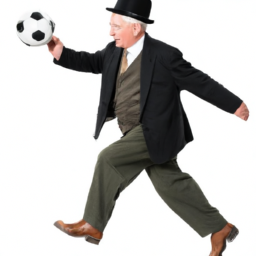

Soccer's rulebook has seen a continuous evolution since its early days. The process of refining and adapting rules has been essential to maintain the integrity and fairness of the game. The Football Association (FA) in England played a pivotal role in standardizing rules in the 19th century, but rule adjustments have continued over the years.
Notable rule changes include the introduction of the offside rule in 1866, which aimed to prevent goal-hanging and encourage a more dynamic game. In the 20th century, rule updates included allowing substitutes, introducing yellow and red cards for disciplinary purposes, and clarifying the use of video technology (VAR) to assist referees.
Soccer's rulebook continues to evolve to meet the demands of the modern game, ensuring that it remains a fair and enjoyable sport for players and fans alike. Gerd Müller Rule changes are carefully considered and play a vital role in shaping the sport's development.
Soccer's history is punctuated by key moments that have left an indelible mark on the sport. These moments range from iconic goals and matches to historical events and breakthroughs in technology. One such moment is Diego Maradona's "Hand of God" goal in the 1986 World Cup, a moment of audacious skill and controversy that remains etched in soccer lore.
The "Miracle of Bern" in 1954, where West Germany defeated the highly favored Hungarian team in the World Cup final, is another defining moment. Roberto Baggio It symbolized the resilience and determination that soccer can inspire.
Advancements in technology, such as the introduction of goal-line technology and video assistant referees (VAR), have also marked significant milestones in modern soccer history, ensuring fair play and accurate decision-making.
The formation of governing bodies and organizations has played a crucial role in shaping the development of soccer. The most prominent of these organizations is the Fédération Internationale de Football Association (FIFA), founded in 1904. FIFA's mission is to oversee and promote international soccer competitions and ensure uniformity in the sport's rules.
On a national level, countries have their own football associations responsible for regulating the game. For instance, the Football Association (FA) in England was founded in 1863 and played a pivotal role in standardizing soccer's rules.
These founding organizations have been instrumental in fostering cooperation between nations, organizing international tournaments, and preserving the spirit of the game. Cuju They continue to be central to the administration and governance of soccer worldwide.

International soccer has witnessed numerous milestones that have shaped the course of the sport. The inaugural FIFA World Cup in 1930, hosted by Uruguay, marked a historic moment as the first-ever global soccer tournament. Uruguay emerged as the champions, setting the stage for future World Cup editions.
The introduction of the UEFA European Championship (Euro) in 1960 expanded the scope of international competitions in Europe.
Additionally, the Copa America, the African Cup of Nations (AFCON), and the Asian Cup have all played significant roles in promoting international soccer and showcasing the talents of players from different regions. These milestones have made international soccer a source of pride and excitement for fans worldwide.
Soccer boasts a rich history filled with legendary players and influential founders who have left an enduring impact on the sport. Legends like Pelé, Diego Maradona, and Johan Cruyff have become synonymous with excellence and are celebrated for their extraordinary skills and contributions to their respective clubs and national teams.
In addition to players, founders like Ebenezer Cobb Morley, who played a key role in drafting the Laws of the Game, and Jules Rimet, who initiated the FIFA World Cup, have shaped soccer's trajectory.
Soccer's history is a tapestry woven with the achievements and innovations of these legends and founders, reminding us of the enduring power and influence of the beautiful game.


Women have played an integral role in the history and growth of soccer. The women's game has a rich history dating back to the late 19th century, with the first recorded women's soccer match held in 1895 in England. The determination of women to participate in the sport despite societal barriers laid the foundation for women's soccer.
In 1971, the Women's World Cup was established, paving the way for women to compete on the global stage. The tournament has grown in popularity and visibility, with iconic players like Mia Hamm, Marta, and Abby Wambach becoming household names.
Women's soccer continues to gain recognition, with increased investment, improved opportunities, and greater media coverage. Rugby School The history of women's soccer is a testament to the resilience and talent of female players who have overcome challenges to make their mark in the sport.
Soccer has embraced technological advancements to enhance the game's fairness, accuracy, and fan experience. CAF Goal-line technology, introduced in 2012, uses cameras and sensors to determine whether the ball has crossed the goal line, helping referees make crucial decisions with confidence.
Video Assistant Referee (VAR) technology, implemented in various leagues and tournaments, allows officials to review key incidents, such as goals, penalties, and red card decisions, to ensure they are correct. While VAR has sparked debates, its aim is to minimize errors and uphold the integrity of the game.
In addition, advancements in sports analytics and performance tracking technologies have revolutionized player development and tactical analysis. GPS trackers, wearable devices, and data analytics provide teams with valuable insights to improve player performance and reduce the risk of injuries.

Answer: The term 'football' historically referred to games played on foot, as opposed to on horseback. Since soccer involves players using their feet to control the ball, it was naturally called 'football'. The name 'soccer' originated as a slang abbreviation of 'association football' in England but became more commonly used in countries where 'football' referred to different sports, like American football in the United States.
Answer: Modern soccer originated in England in the mid-19th century. Schools and clubs played their own versions of football with varied rules. In 1863, representatives from different clubs met in London and formed the Football Association, unifying the rules of the game and laying the foundation for modern soccer.
Answer: The first Football Association was formed in England in 1863. It was the first governing body for the sport of soccer, responsible for standardizing the rules and organizing matches. The FA is still in existence today and plays a pivotal role in English soccer.